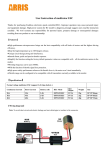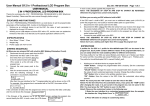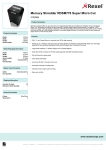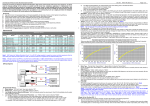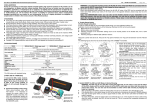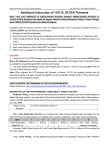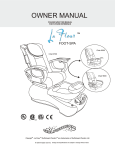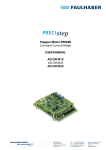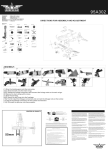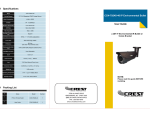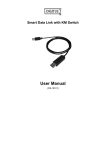Transcript
Thank you for purchasing this HOBBYWING product! Brushless power systems can be very dangerous. Any improper use may cause personal injury and damage to the ATTENTION product and related devices. We strongly recommend reading through this user manual before use. Because we have no control over the use, installation, or maintenance of this product, no liability may be assumed for any damages or USER MANUAL losses resulting from the use of the product. We do not assume responsibility for any Multi-Rotor CAUTIONS Brushless Electronic Speed Controller XRotor Pro 40A • XRotor Pro 50A losses caused by unauthorized modifications to our product. 01 Features • Special core program for multi-rotor controllers greatly improves throttle response. • DEO (Driving Efficiency Optimization) technology significantly improves throttle linearity and driving efficiency. • High intelligent and adaptive default settings like auto-adjusting timing meet almost all applications. • The twisted-pair design of the throttle signal cable effectively reduces the crosstalk produced in signal transmission and makes flight more stable. • Compatible with various flight-control systems and supports a signal frequency of up to 621Hz. (Note: all throttle signals over 500Hz are non-standard signals.) • The high-light LED position on the XRotor Pro 50A ESC saves the trouble of mounting any extra color light on multi-rotors. • The DIP switches at the bottom of the XRotor Pro 50A ESC control the ESC ON/OFF status, color of the LED light, ON/OFF of the DEO function and the motor rotation. 02 Specifications Model Con. Current Peak Current (10s) BEC LiPo Programmable Item Weight XRotor Pro 40A 40A 60A NO 3-6S DEO (ON/OFF) 50g (Version A) 45g (Version B) 66x21.8x11mm (Version A) 73.5x21.8x11mm (Version B) Size XRotor Pro 50A 50A 70A NO 4-6S DEO(ON/OFF) and etc. (See instructions below) 56g 48 x 30 x 15.5mm Note: Version A (Wire Leaded) connects brushless motor via output wires, while Version B (COB-Connector On Board) with gold-plated connectors already directly soldered onto the printed circuit board of the ESC, so Version B hasn't output wires. 03 User Guide Throttle Calibration & ESC Programming Users need to calibrate the throttle range when they start to use a new XRotor brushless ESC or another transmitter. 1 Motor Wiring Electronic Speed Controller Plug the throttle signal cable into the throttle (TH) channel on your receiver. Battery Motor Receiver Plug the UBEC cable into the special battery (BATT) channel or any other unoccupied channel on UBEC 2 3 your receiver. Throttle Range Calibration We strongly recommend removing the Turn on the Ensure the transmitter and receiver After the motor emits transmitter, move are well bound, and then connect two short “Beep-beep”, Throttle the throttle stick the ESC to the battery. move the throttle stick Calibration to the top (The receiver needs to be powered to the bottom position completed position. by an extra power supply.) in 3 seconds. propellers for your own safety and the safety of those around you before IMPORTANT performing calibration and programming functions with this system. ESC Programming A) XRotor Pro 40A Turn on the Connect the receiver to the transmitter, and then battery and ensure the transmitter move the throttle stick and receiver are well bound, and to the top position. then power on the ESC. The motor will beep different tones circularly. “Beep-beep-”Throttle Calibration; “Beep-beep-beep-”DEO ON; Programming “Beep-beep-beep-beep-” DEO OFF; If the throttle stick is moved to is completed; the bottom position 3 seconds after you hear the corresponding and the ESC is beeps, then the programming of that item is complete. ready. B) XRotor Pro 50A Dip Switch Switch #1 (LED Status) Switch #2 (LED Color) Switch #3 (DEO Status) Switch #4 (Motor Rotation) On Red On CW Off Green Off CCW Option With the DEO ON, for better throttle linearity, the ESC will automatically brake and quickly reduce the motor speed when decreasing the throttle amount. This can remarkably improve IMPORTANT the movement of the multi-rotors and the stability of its flight direction. Moreover, this also improves the driving efficiency of the ESC and reduces its operating temperature. 04 Normal Start-up Process and Protections Turn on the transmitter and move the throttle stick to the bottom position. The motor will emit a long “beep —“1 second after the system is connected to the battery indicating the ESC is armed and the multi-rotor is ready to go. • Start-up Protection: The ESC will shut down the motor if it fails to start the motor normally within 2 seconds by increasing the throttle value. In this case, you need to move the transmitter throttle stick back to the bottom position and restart the motor. (Possible causes of this problem: poor connection/ disconnection between the ESC and motor wires, propellers are blocked, etc.) • Over-load Protection: The ESC will cut off the power/output when the load suddenly increases to a very high value. Normal operation will not resume until the throttle stick is moved back to the neutral position. The ESC will automatically attempt to restart when the motor and the ESC are out of sync. • Throttle Signal Loss Protection: When the ESC detects loss of signal for over 0.25 second, it will cut off the output immediately to avoid an even greater loss which may be caused by the continuous high-speed rotation of propellers or rotor blades. The ESC will resume the corresponding output after normal signals are received. 05 Trouble shooting Trouble Warning Tone Possible Cause Solution The ESC was unable to start the motor. “Beep beep beep…” (The motor beeps rapidly) The throttle stick is not at the bottom position. Move the throttle stick to the bottom position or recalibrate the throttle range. The ESC was unable to start the motor. “Beep, beep, beep......” (Time interval is 1 second) No output signal from the throttle channel on the receiver. Check if the transmitter and receiver are well bound; Check if the throttle wire has been properly plugged into the throttle channel on the receiver. The ESC was unable to start the motor. “BB, BBB, BBBB” (These tones are played circularly) The“Normal / Reverse” direction of the throttle channel on transmitter is incorrect. Refer to the transmitter instructions and correctly set the "Normal/ Reverse" direction of the throttle channel.

